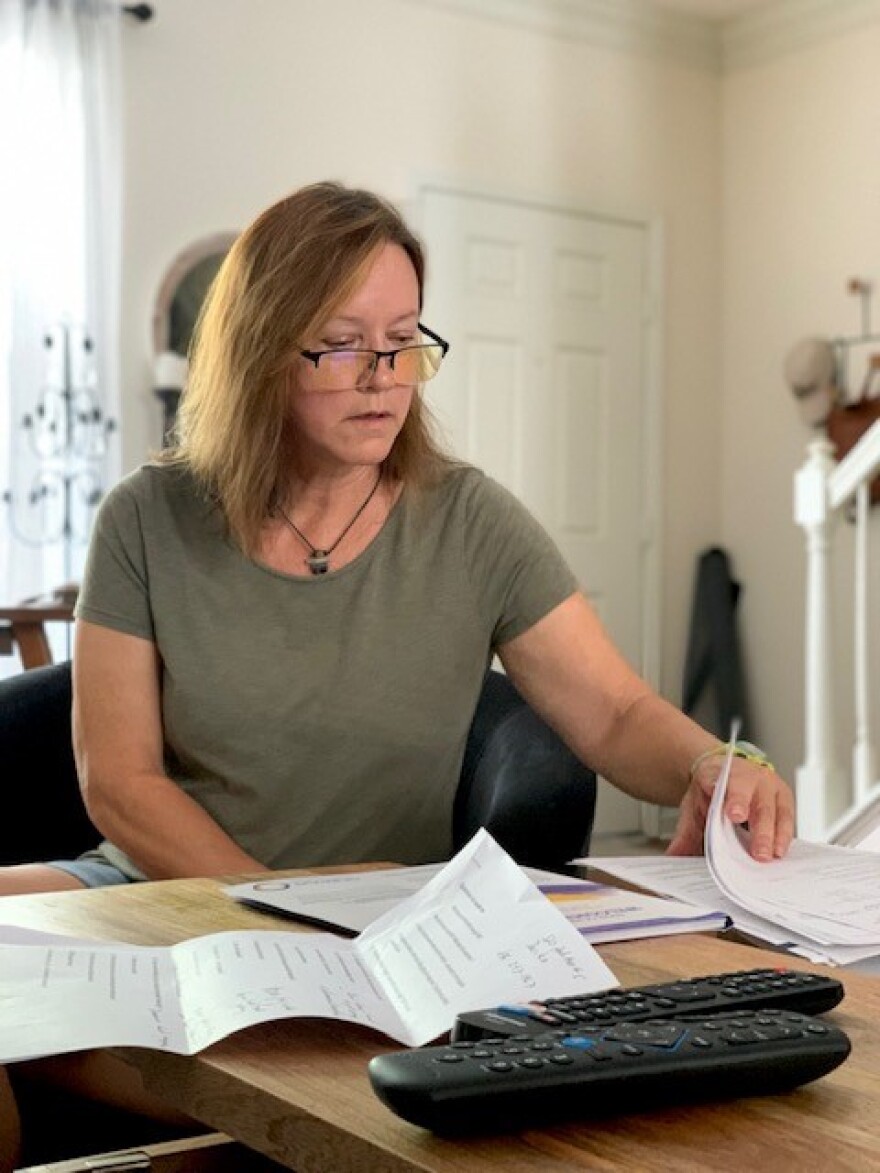For the past eight weeks, The Price We Pay has examined why Americans are less healthy than people in other wealthy countries, and why, according to the Organization for Economic Cooperation and Development, we spend about twice as much on care .

Today, we start to examine solutions — what the government can do and what it has difficulty doing.
Thirty million Americans are uninsured, and many people with insurance can’t afford to pay for care. Among them is Jennifer Fear of Davidson, just north of Charlotte. She’s happiest when she’s hiking, cycling or gardening. But she thought she would lose all one weekend in 2016.
“I started feeling numbness in my right foot,” Fear said. “It then started in my left foot and it also continued to progress upward. I ended up sleeping with a phone in my hand because I just didn’t know how far that numbness and quasi-paralysis was going to continue.”
The diagnosis was multiple sclerosis, an incurable degenerative disease that can result in blindness, paralysis and difficulty thinking.
Fortunately, Fear had good health insurance through her job in St. Louis. She improved and was hiking again within seven months. Last year, she moved to Davidson to be near family. Fear thought the insurance she purchased on the individual market would cover her medicine. But when she tried to reorder her prescription, she was told it wasn’t covered.
“It will be $5,600 for one shipment,” she was told. Her immediate reply: “Is there any way you can stop that shipment ... before it gets to my door?”
Fear says she skipped her medication for almost a year and prayed she wouldn’t relapse.
Forty-six million Americans skipped care last year because of cost, a Gallup survey found. The problem is both underinsurance and the high cost of care.
Congress started to address the problem of underinsurance last year by increasing Affordable Care Act subsidies so no one has to pay more than 8.5% of their income on premiums. But those subsidies will run out after next year. Many Democrats now want to make them permanent in a proposed $3.5 trillion funding bill that addresses health care and slew of other social issues.
It’s all part of a Capitol Hill battle that illustrates the dynamics of how difficult it is for the government to address complex societal issues. And those include our health care problems, says UNC Chapel Hill health policy professor Jonathan Oberlander.
“We live in polarized America,” Oberlander said. “And I think the Affordable Care Act and health care have been caught up in that polarization.”
Democrats expect no Republican support for the bill. They’re having trouble figuring out how to pay for it, and there are ideological differences among Democrats, too. West Virginia Democratic U.S. Sen. Joe Manchin wants to keep down the bill’s total cost, while independent Vermont Sen. Bernie Sanders wants to go big.
Last Wednesday, the two had battling press conferences over their priorities. Manchin wants the government to pay for new benefits only for the less affluent.
“I don’t believe we should turn our society into an entitlement society,” he said.
But Sanders wants new vision, dental and hearing benefits for all Medicare recipients.
“Does Sen. Manchin believe seniors are not entitled to digest their food?” he shot back.
So while President Joe Biden came into office with a large health care agenda, Democrats are whittling down their priorities. In addition to extending those subsidies for Obamacare policies and adding dental and vision benefits to Medicare, they also want to provide coverage for the poorest Americans who live in states like North Carolina and South Carolina, which haven’t expanded Medicaid.
There are 3.2 million uninsured people below the poverty level who live in the 12 states that haven’t expanded Medicaid, including over 600,000 in North Carolina, according to estimates from the Urban Institute and the North Carolina Department of Health and Human Services.
South Carolina’s lone Democrat in Congress, Rep. Jim Clyburn, says providing coverage to them should be paramount.
“My priority is the expansion of Medicaid and I do know that Bernie Sanders’ priority is the expansion of Medicare,” Clyburn said.
Racial disparities in access to health care have declined in states that expanded Medicaid, the Commonwealth Fund reports. Clyburn says covering the poor in the 12 holdout states is important for African Americans.
“This has racial equity issues all boiled into it,” Clyburn said. “When you tell me well 12 states (haven’t expanded Medicaid and) eight of them in the South — these are red states? These are Black states.”
And as the man whose endorsement helped Biden win the 2020 Democratic primary in South Carolina, he makes it clear that he’s got some leverage.
“This is just everybody trying to get other people to understand the sensitivities that you’ll have here in this red state that propelled Joe Biden to the presidency,” Clyburn said.
Democrats had planned to cover some of the cost of the bill by allowing Medicare to negotiate down drug prices. The Congressional Budget Office projects one measure to do that using international prices as a reference would save the government $456 billion over 10 years. Polls show that allowing Medicare to negotiate has enormous popular support, and lobbyists for employer groups want lower prices to be extended to everyone. But some lawmakers are worried it could hurt innovation.
And as UNC’s Jonathan Oberlander points out, “the most important political dynamic in health care is a dollar of health care spending is a dollar of somebody else’s income and pharma has not been eager to be regulated by the federal government or have more price regulation.”
The pharmaceutical industry has spent more than $171 million on lobbying this year, according to Open Secrets, a group that tracks money in politics. It’s campaigning to defeat the measure, and when it came up for a vote in a congressional committee, several Democrats voted against it.
So the measure to cut drug prices is being whittled down, too, which means there’s less money to cover other things. And it illustrates why it’s often even harder for the government to cut spending than it is to expand coverage. There's always opposition from health care providers who want to earn more, says Harvard University health economist David Cutler, who helped write the Affordable Care Act.
“It’s much easier to expand coverage because you're sort of giving things out,” Cutler said. “The problem with saving money (is that) every dollar that you save is someone’s income that they’re not earning.”
Politics may make it difficult for Congress to address spending and high prices. But Cutler says there are other things the president can do.
The Trump administration tried to lower prices by requiring hospitals to post their charges online. Compliance so far has been poor, and Cutler says it’s hard to get patients to comparison shop.
Biden hopes to reduce price hikes by making it harder for providers to consolidate to encourage competition. Cutler says that’s promising, but it would have been more effective years ago
“Most of the horses are already out of the barn,” Cutler said. “They’ve already merged and done whatever.”
Still, Cutler says the Biden administration has other tools at its disposal to reduce overall government spending, like changing how it pays for health care, to force providers to charge less.
“Some of that will be by the government getting more involved in just saying, like, 'I’m just not going to take it anymore,'” Cutler said. “'Want to participate in these programs? You’re going to do X, Y and Z and just shut up and do them already.'”
Cutler says the government could also reduce administrative costs, which account for as much as one-third of health care spending. But so far there’s been no movement on that.

As for Fear, she was able to afford better coverage after she got a new job. That wouldn’t have been possible before Congress passed the Affordable Care Act in 2010, making it illegal for insurance companies to refuse coverage to people with pre-existing conditions like multiple sclerosis.
But she still can’t afford the $6,637 copay for her new medication. As a conservative, she shares Manchin’s concern about entitlement programs, but she thinks Congress needs to realize the free market isn’t working for health care.
“I very much believe in being responsible, paying your fair share,” Fear said. “But when the costs of some of those basic things make it unattainable, I think something is out of whack quite honestly.”
But as of today, it’s anyone’s guess how much or how little the current Congress can achieve.









